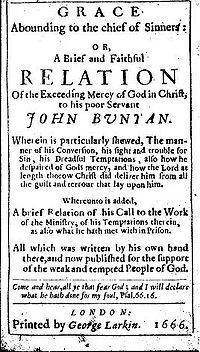
Spiritual autobiography
Encyclopedia

England
England is a country that is part of the United Kingdom. It shares land borders with Scotland to the north and Wales to the west; the Irish Sea is to the north west, the Celtic Sea to the south west, with the North Sea to the east and the English Channel to the south separating it from continental...
, particularly that of dissenters
English Dissenters
English Dissenters were Christians who separated from the Church of England in the 16th, 17th and 18th centuries.They originally agitated for a wide reaching Protestant Reformation of the Established Church, and triumphed briefly under Oliver Cromwell....
. The narrative follows the believer from a state of damnation to a state of grace; the most famous example is perhaps John Bunyan
John Bunyan
John Bunyan was an English Christian writer and preacher, famous for writing The Pilgrim's Progress. Though he was a Reformed Baptist, in the Church of England he is remembered with a Lesser Festival on 30 August, and on the liturgical calendar of the Episcopal Church on 29 August.-Life:In 1628,...
's Grace Abounding (1666).
Because so many autobiographies were written, they began to fall into a predictable pattern. The "formula" began with a sinful youth, "followed by a gradual awakening of spiritual feelings and a sense of anxiety about the prospects for one's soul." The person would repent, fall again into sin, repent, and sin again; such cycles could last for years. The Bible
Bible
The Bible refers to any one of the collections of the primary religious texts of Judaism and Christianity. There is no common version of the Bible, as the individual books , their contents and their order vary among denominations...
was often a source of comfort or fear during this time. Finally, the person had a conversion experience, an "epiphany, often of an emotionally shattering character, by which individuals came to realise that they had been singled out by God for salvation." Life was not necessarily easy after this, but it was a good deal less traumatic. These overarching narratives were seen to be not only relevant to human life, but also to human history. Those who practiced this type of spiritual autobiography believed that "history repeats itself not only in man's outward, group existence, but in the spiritual life of individuals."
The spiritual autobiography's intense focus on the individual has led scholars to see it as a precursor to the novel
Novel
A novel is a book of long narrative in literary prose. The genre has historical roots both in the fields of the medieval and early modern romance and in the tradition of the novella. The latter supplied the present generic term in the late 18th century....
, with later writers such as Daniel Defoe
Daniel Defoe
Daniel Defoe , born Daniel Foe, was an English trader, writer, journalist, and pamphleteer, who gained fame for his novel Robinson Crusoe. Defoe is notable for being one of the earliest proponents of the novel, as he helped to popularise the form in Britain and along with others such as Richardson,...
writing fictionalized accounts of a character's spiritual journey, such as Robinson Crusoe
Robinson Crusoe
Robinson Crusoe is a novel by Daniel Defoe that was first published in 1719. Epistolary, confessional, and didactic in form, the book is a fictional autobiography of the title character—a castaway who spends 28 years on a remote tropical island near Trinidad, encountering cannibals, captives, and...
. Moreover, because, as G. A. Starr argues, English Protestantism had rejected the "otherworldliness" of Catholicism
Catholicism
Catholicism is a broad term for the body of the Catholic faith, its theologies and doctrines, its liturgical, ethical, spiritual, and behavioral characteristics, as well as a religious people as a whole....
"and insisted on the compatibility of earthly and spiritual callings," the "utterly mundane activities could be drawn upon to illustrate and enforce religious duties." This also contributed to the growth of what we now know as the novel.
Selection of spiritual autobiographies
- John Bunyan'sJohn BunyanJohn Bunyan was an English Christian writer and preacher, famous for writing The Pilgrim's Progress. Though he was a Reformed Baptist, in the Church of England he is remembered with a Lesser Festival on 30 August, and on the liturgical calendar of the Episcopal Church on 29 August.-Life:In 1628,...
Grace Abounding - Richard Norwood's Confessions
- A Short History of the Life of John Crook
- Lawrence Clarkson's The Lost Sheep Found
- The Narrative of the Persecution of Agnes Beaumont
- William Apess' "A Son of the Forest"
- Play of Consciousness: A Spiritual Autobiography by Swami MuktanandaMuktanandaSwami Muktananda is the monastic name of an Indian Hindu guru and disciple of Bhagavan Nityananda. Swami Muktananda was the founder of Siddha Yoga...
Resources
- Caldwell, Patricia. The Puritan Conversion Narrative. Cambridge (1983).
- Damrosch, Leopold, Jr. God's Plot and Man's Stories. Chicago (1985).
- Delany, Paul. British Autobiography in the Seventeenth Century. London (1969).
- Ebner, Dean. Autobiography in Seventeenth-Century England. The Hague (1971).
- Hindmarsh, D. Bruce. The Evangelical Conversion Narrative: Spiritual Autobiography in Early Modern England. Oxford: Oxford University Press, 2005.
- Spacks, Patricia Meyer. Imagining a Self: Autobiography and Novel in Eighteenth-Century England. Cambridge: Harvard University Press, 1976.
- Starr, G. A. Defoe and Spiritual Autobiography. Princeton: Princeton University Press, 1965.
External links
- Full text of John Bunyan's Grace Abounding at Project GutenbergProject GutenbergProject Gutenberg is a volunteer effort to digitize and archive cultural works, to "encourage the creation and distribution of eBooks". Founded in 1971 by Michael S. Hart, it is the oldest digital library. Most of the items in its collection are the full texts of public domain books...

